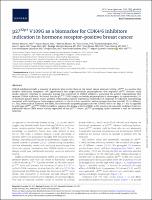p27Kip1 V109G as a biomarker for CDK4/6 inhibitors indication in hormone receptor–positive breast cancer
Author
Date
2023-04Permanent link
https://hdl.handle.net/11351/9407DOI
10.1093/jncics/pkad014
ISSN
2515-5091
WOS
000959320200004
PMID
36806942
Abstract
CDK4/6 inhibitors benefit a minority of patients who receive them in the breast cancer adjuvant setting. p27Kip1 is a protein that inhibits CDK/Cyclin complexes. We hypothesized that single-nucleotide polymorphisms that impaired p27Kip1 function could render patients refractory to endocrine therapy but responsive to CDK4/6 inhibitors, narrowing the patient subpopulation that requires CDK4/6 inhibitors. We found that the p27Kip1 V109G single-nucleotide polymorphism is homozygous in approximately 15% of hormone-positive breast cancer patients. Polymorphic patients experience rapid failure in response to endocrine monotherapy compared with wild-type or heterozygous patients in the first-line metastatic setting (progression-free survival: 92 vs 485 days, P < .001); when CDK4/6 inhibitors are added, the differences disappear (progression-free survival: 658 vs 761 days, P = .92). As opposed to wild-type p27Kip1, p27Kip1 V109G is unable to suppress the kinase activity of CDK4 in the presence of endocrine inhibitors; however, palbociclib blocks CDK4 kinase activity regardless of the p27Kip1 status. p27Kip1 genotyping could constitute a tool for treatment selection.
Keywords
Biomarker; Hormone receptor-positive; Breast cancerBibliographic citation
Mouron S, Bueno MJ, Muñoz M, Torres R, Rodríguez S, Apala J V, et al. p27Kip1 V109G as a biomarker for CDK4/6 inhibitors indication in hormone receptor-positive breast cancer. JNCI Cancer Spectr. 2023 Apr;7(2):pkad014.
Audience
Professionals
This item appears in following collections
- VHIO - Articles científics [1250]
The following license files are associated with this item:

 Private area
Private area Contact Us
Contact Us







